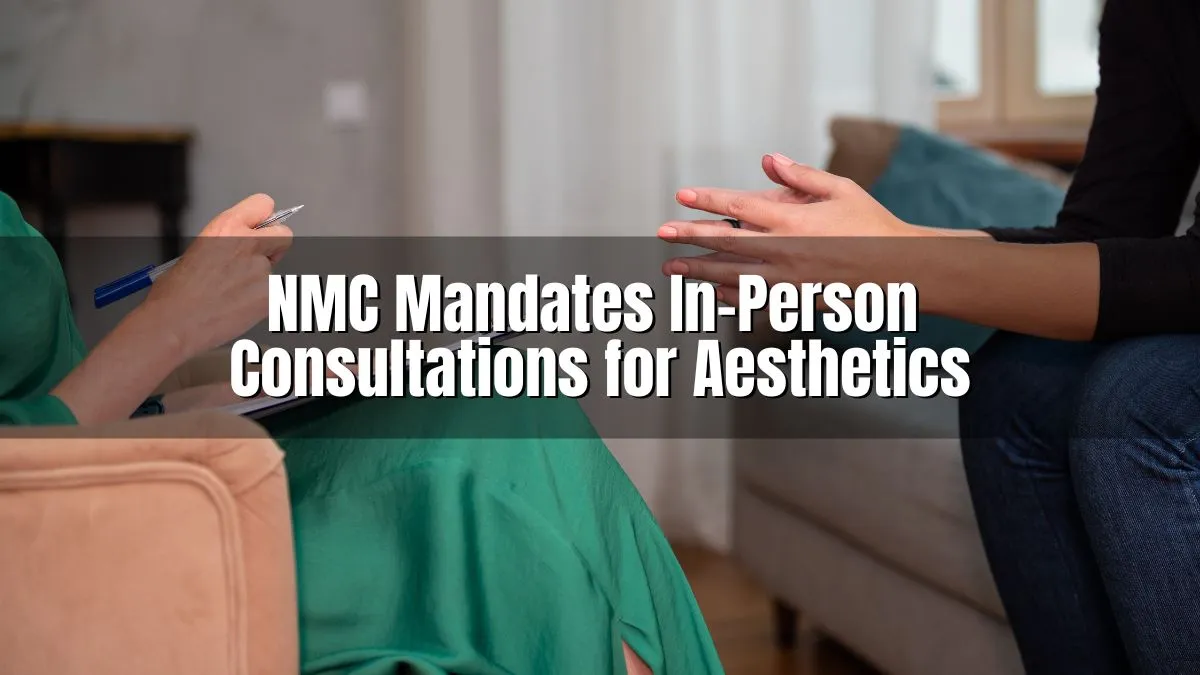NMC Mandates In-Person Consultations
for Aesthetic Prescribing

Understanding the NMC's 2025 Update on Remote Prescribing in Aesthetics
In a significant move to enhance patient safety, the Nursing and Midwifery Council (NMC) has announced that, effective June 1, 2025, all nursing and midwifery prescribers in the UK must conduct face-to-face consultations before prescribing non-surgical cosmetic treatments. This update aims to align aesthetic practices with other healthcare sectors, ensuring consistent and safe patient care.
Table of Contents
ToggleWhat Does the New NMC Guidance Entail?
The updated NMC guidelines stipulate that:
- Mandatory In-Person Consultations: Prescribers must see patients face-to-face before issuing prescriptions for non-surgical cosmetic procedures, including anti-wrinkle injections and aesthetic emergency kit items.
- Comprehensive Clinical Assessments: A thorough evaluation of the patient’s medical history and suitability for treatment must be documented during the in-person consultation.
- Prohibition of Remote Prescribing: Prescriptions cannot be issued via telephone, email, video calls, or through third parties.
- Applicable to All Consultations: This requirement extends to initial consultations, follow-ups, and any subsequent assessments related to the treatment.
These measures are designed to ensure that prescriptions for aesthetic treatments are made based on a comprehensive understanding of the patient’s health status, thereby minimizing risks and enhancing treatment efficacy.
Why Is Remote Prescribing Being Prohibited?
The decision to mandate in-person consultations stems from concerns over patient safety and the need for consistent regulatory standards across the healthcare sector. Key reasons include:
- Inadequate Patient Assessment: Remote consultations may not allow for a full evaluation of the patient’s physical and psychological suitability for certain treatments.
- Risk of Miscommunication: Non-verbal cues and subtle clinical signs can be missed during remote interactions, potentially leading to inappropriate treatment plans.
- Public Safety Concerns: Research commissioned by the NMC revealed that many patients were unaware of the qualifications of practitioners or the origin of prescribed medicines, raising concerns about the safety and legitimacy of treatments received remotely.
- Alignment with Other Regulators: The NMC’s move brings its policies in line with other UK health regulators, such as the General Medical Council (GMC) and the General Dental Council (GDC), which have already prohibited remote prescribing for cosmetic procedures.
- Inadequate Patient Assessment: Remote consultations may not allow for a full evaluation of the patient’s physical and psychological suitability for certain treatments.
By enforcing face-to-face consultations, the NMC aims to uphold high standards of care and protect patients from potential harm associated with remote prescribing practices.
Impact on Aesthetic Clinics and Practitioners
The new regulations will have significant implications for aesthetic clinics and practitioners:
- Operational Adjustments: Clinics must revise their appointment scheduling and consultation processes to accommodate in-person assessments.
- Training and Compliance: Practitioners need to be trained on the new guidelines to ensure full compliance and avoid potential disciplinary actions.
- Insurance Considerations: Failure to adhere to the updated regulations may affect professional indemnity insurance coverage, leaving practitioners vulnerable to legal and financial repercussions.
- Patient Communication: Clinics should proactively inform patients about the changes to manage expectations and maintain trust.
- Operational Adjustments: Clinics must revise their appointment scheduling and consultation processes to accommodate in-person assessments.
Adapting to these changes is crucial for clinics to continue providing safe, effective, and legally compliant aesthetic treatments.
What This Means for You as a Client
From June 2025, when you visit an aesthetic clinic for prescription-based treatments like anti-wrinkle injections or dermal fillers, here’s what you can expect under the new NMC regulations:
- Face-to-Face Consultations Are Now Essential: You will need to meet your prescriber in person before receiving any treatment. This ensures your health, medical history, and treatment goals are properly assessed.
- Improved Safety and Personalised Care: In-person consultations allow your practitioner to identify any physical or emotional concerns that may not be visible via video or phone calls, leading to more accurate and safer treatment plans.
- Transparency About Who Is Treating You: The changes ensure you know exactly who is prescribing your treatment, their qualifications, and that they’ve personally evaluated your needs.
- Greater Confidence in Your Treatment Plan: Knowing that a qualified professional has taken the time to examine you thoroughly provides peace of mind and confidence in the results.
- No More Remote-Only Services: If a clinic offers prescription treatments without first seeing you in person, they are not compliant with the new regulations—and this could be a red flag.
- Face-to-Face Consultations Are Now Essential: You will need to meet your prescriber in person before receiving any treatment. This ensures your health, medical history, and treatment goals are properly assessed.
How to Make Sure You're in Safe Hands
When choosing a clinic:
- Ask if your consultation will be in-person with the actual prescriber.
- Confirm the credentials of the person prescribing and administering your treatment.
- Avoid services that only offer online consultations for prescription-based procedures.
- Ask if your consultation will be in-person with the actual prescriber.
Choose reputable, regulated providers who are transparent about following current guidelines.
Conclusion: What These Changes Mean for You
Frequently Asked Questions (FAQs)
The NMC mandates in-person consultations to improve patient safety, ensure accurate assessments, and align with other healthcare regulatory standards.
No. From June 2025, all prescribing for aesthetic treatments must be preceded by a face-to-face consultation with the prescriber.
Yes. The guidance applies to initial consultations, follow-up assessments, and any situation where a prescription is required.
Clinics that do not comply may be acting outside NMC guidelines, which could affect patient safety and indicate regulatory violations.
Ask if your consultation will be in-person with the prescriber, and confirm their credentials and regulatory status.